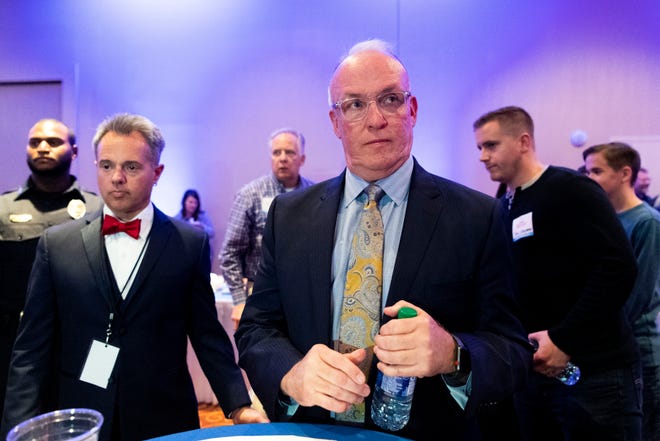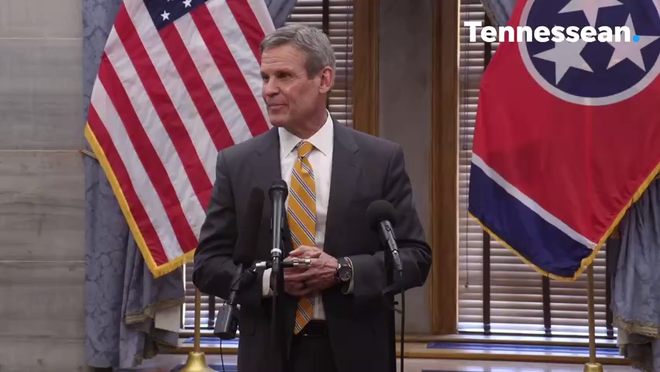Knoxville state Rep. Eddie Mannis, the first openly gay member of the Republican Party to be elected to Tennessee’s General Assembly, sent a letter to colleagues in opposition to legislation that would restrict how transgender athletes compete in middle and high school sports.
Mannis’ letter was sent Monday to members of the House Education Administration Committee. Mannis is not part of the committee. He is the lone Republican to speak against the bill. His secretary provided a copy of the letter to Knox News on Thursday.
“As we strive to represent ALL of our students, this legislation could very well marginalize a percentage of our kids and have a tremendous impact on them both physically and mentally,” he wrote.
“I trust that you will extend grace and mercy to the circumstance that none of us may totally understand and remember that we are here to represent all our kids … that includes those who may be suffering silently but have the access and right to participate and enjoy the same activities as their classmates.”

The legislation asserts it is unfair for student athletes to compete with each other if they do not share the same biological sex. The bill, which argues boys can be physically stronger than girls and injure them in competition, would effectively ban student participation in school sports under their chosen gender identity.
RELATED:Tennessee’s bill targeting transgender teen athletes clears committees, heads toward final votes
Similar legislation triggered controversy last year and failed to advance in either legislative chamber. While proponents say the bill is about fairness and gender equality, the bill spurred criticism that it discriminates against transgender children.
Debate over the legislation comes following an executive order from President Joe Biden’s administration, which bars gender discrimination, including denying students access to school sports based on their gender identity.
Gov. Bill Lee has said that allowing transgender girls to compete would “destroy women’s sports” as we know them and Thursday, Lt. Gov. Randy McNally, R-Oak Ridge, said though he doesn’t think any transgender athletes are competing in Tennessee high school sports, he’ll likely vote for the bill. McNally previously said lawmakers should “move with caution” on the legislation.
The bill passed committee votes in both the House and Senate, and will be moved to both floors for a final vote, though no date has been set.
Potential repercussions
Mannis’ main concern about the proposed legislation is the impact on the mental health of students, particularly transgender students, which he said have a much higher rate of suicidal thoughts.
He also relayed a story from his time working in the Knoxville mayor’s office in 2012 he heard from a Knoxville businessman. The man, whom Mannis did not name, said policy that is perceived as being discriminatory or marginalizing makes it hard for the company to recruit to Knoxville and the state.

“Job creators seek states and communities that are welcoming to everyone, including their families, employees and customers,” Mannis wrote.
“This issue will be divisive and will be used against us in general elections for years to come, and likely lead to costly legal battles in the courts,” he continued.
COLUMN:Tennessee’s transgender sports bill is searching for a problem that doesn’t exist
In a statement to Knox News, Mannis said the bill hasn’t been an issue in the state and there are no known examples of problems in middle and high school competition that the bill purports to address.
“I don’t disagree that it may not be the best idea for boys to play on girls’ teams,” he said. “My issue is that transgenders, that have gone through transition therapy, should be exempt from this status. I realize that in Tennessee your birth gender cannot be changed regardless.
“At the end of the day, we must be brave enough to make our own individual decisions and for that, I will have no regret,” he continued.
Shortly after he was elected in November, he told Knox News having himself and Memphis Democrat Torrey Harris, who is bisexual, in the House would be beneficial in spurring conversations on controversial topics.
“I think having two gay men, one Democrat and one Republican, brings a different perspective that maybe (hasn’t) existed in the legislative body ever before,” he said. “In all fairness, there’s no way they can understand that perspective or speak from that perspective.
“I’m sure having a seat at the table when those conversations come around will change that perspective,” he continued. “Or at least will change the conversation. I don’t know if I can say ‘change the perspective,’ but it will definitely change the conversation.”
Mannis’ election to the General Assembly has been a fraught one within his own party. Knox County Republican Party Chairman Randy Pace and others said early on that he wasn’t a true Republican because he had previously voted for Democrats.
Mannis defeated challenger Gina Oster by 99 votes in August’s party primary, but she filed a challenge with the Tennessee Republican Party’s State Executive Committee, saying Mannis is a Democrat and that he received cross-over votes in the Republican primary – meaning Democrats who voted on a Republican ballot. In September committee members overwhelmingly supported his candidacy.

